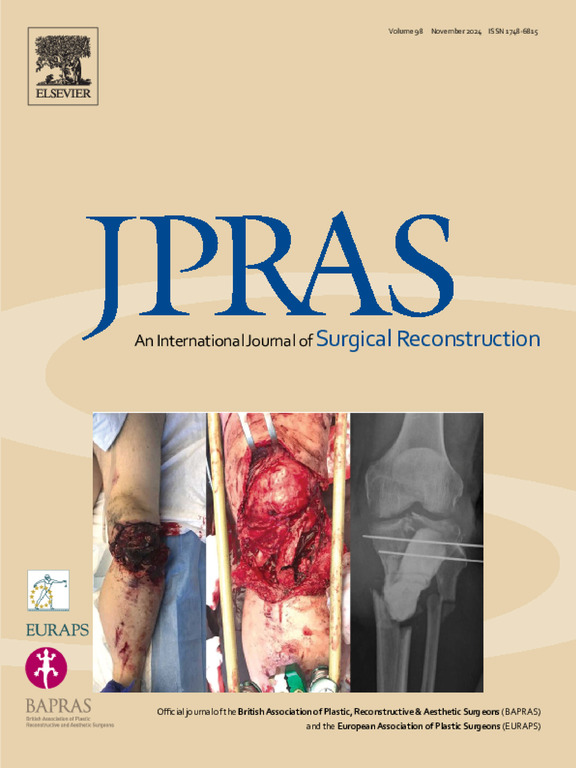Cost-effective strategies for reducing carbon emissions in plastic surgery
IF 2
3区 医学
Q2 SURGERY
Journal of Plastic Reconstructive and Aesthetic Surgery
Pub Date : 2025-06-07
DOI:10.1016/j.bjps.2025.06.003
引用次数: 0
Abstract
Background
Global warming is the biggest health threat of the 21st century. If healthcare were a country, it would be the 5th largest greenhouse gas emitter on the planet. The operating theatre produces 21–30% more waste than the rest of the hospital. This study aimed to implement carbon and cost saving measures in plastic surgery from minor operations to free flap reconstruction.
Method
Evaluate current departmental use of disposable sets and consumables. Perform a financial and environmental cost analysis comparing disposable and reusable minor plastic surgical sets. Repeat the same analysis and apply findings on rationalising main theatre plastics sets. Jamovi (2.3.28) built on R statistical language was used for statistical analysis.
Results
Introducing new minor plastics sets to main theatre with a 77% reduction in instruments from the previous major plastics sets for smaller cases can save €50310 and 2900–3388kgCO2e. Microsurgical breast reconstruction set contents were decreased by 55% along with reducing single use consumables, amounting to an annual saving of €10696 and 155–181kgCO2e. Up to 6500 disposable minor surgical sets per year are consumed in the three plastic surgery units within the HSE West Hospital Group. By removing disposable sets from one unit entirely, our projected savings will be €13173 and 2199.35 kgCO2e.
Conclusion
We have improved our environmental and economic impact on the hospital, with potential savings of over €74′000 and 5.7 t CO2e with no deficits to patient care. These carbon savings are the equivalent to the emissions produced by a new car driving approximately 1.33 times around the Earth’s circumference. These changes can be easily replicated across other departments to affect more widespread savings.
降低整形手术碳排放的成本效益策略
全球变暖是21世纪最大的健康威胁。如果医疗保健是一个国家,它将是地球上第五大温室气体排放国。手术室产生的废物比医院其他地方多21-30%。本研究旨在实施从小手术到游离皮瓣重建的整形手术的碳和成本节约措施。方法评估当前部门一次性用品和消耗品的使用情况。进行财务和环境成本分析,比较一次性和可重复使用的小型整形手术设备。重复相同的分析,并将结果应用于合理化主要剧院塑料装置。采用基于R统计语言构建的Jamovi(2.3.28)进行统计分析。结果:在主剧院引入新的小型塑料设备,与之前用于小型病例的主要塑料设备相比,减少了77%的设备,可以节省50310欧元和2900 - 3388千克二氧化碳当量。显微外科乳房重建套装的内容减少了55%,同时减少了一次性耗材,每年节省€10696和155-181kgCO2e。HSE西部医院集团的三个整形外科单位每年消耗的一次性小手术套多达6500套。通过从一个单位中完全去除一次性套装,我们预计将节省13173欧元和2199.35公斤二氧化碳当量。结论:我们已经改善了我们对医院的环境和经济影响,潜在节省超过74,000欧元和5.7吨二氧化碳当量,没有病人护理赤字。这些节省的碳排放量相当于一辆新车绕地球圆周行驶约1.33圈所产生的排放量。这些更改可以很容易地在其他部门之间复制,从而影响更广泛的节省。
本文章由计算机程序翻译,如有差异,请以英文原文为准。
求助全文
约1分钟内获得全文
求助全文
来源期刊
CiteScore
3.10
自引率
11.10%
发文量
578
审稿时长
3.5 months
期刊介绍:
JPRAS An International Journal of Surgical Reconstruction is one of the world''s leading international journals, covering all the reconstructive and aesthetic aspects of plastic surgery.
The journal presents the latest surgical procedures with audit and outcome studies of new and established techniques in plastic surgery including: cleft lip and palate and other heads and neck surgery, hand surgery, lower limb trauma, burns, skin cancer, breast surgery and aesthetic surgery.

 求助内容:
求助内容: 应助结果提醒方式:
应助结果提醒方式:


